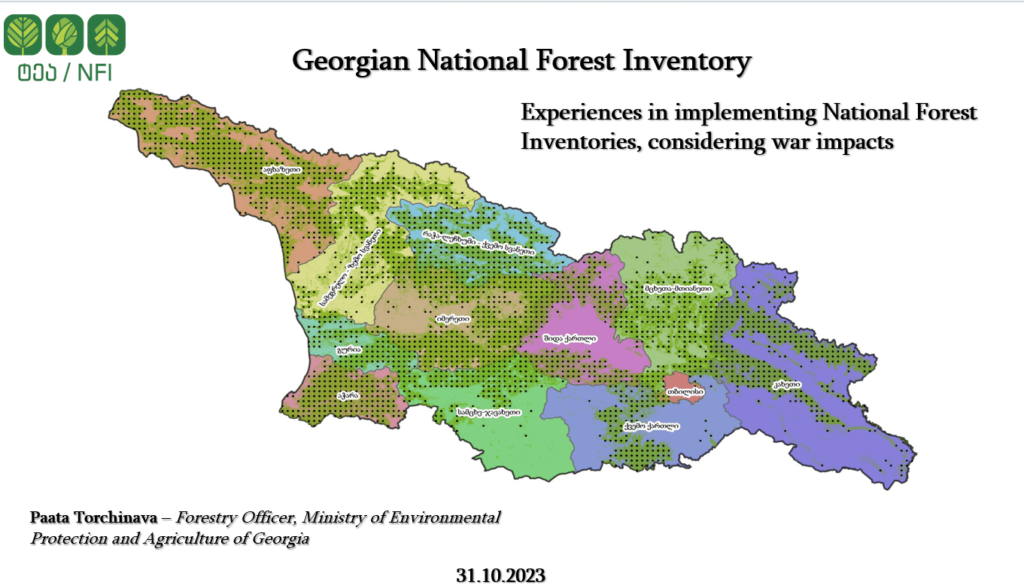
Considering the impact of the Russian occupation on the forestry sector and particularly on the National Forest Inventory (NFI), the SFI-Project organised an information exchange between Ukrainian and Georgian forestry experts on 31.10.2023. 25 experts from Georgia, Ukraine, and Germany participated in this online-event.
In their welcome speeches both, Karlo Amirgulashvili, Head of the Biodiversity and Forest Policy Department of the Ministry of Environmental Protection and Agriculture of Georgia, and Igor Budzinskyі, Head of Forestry Department of State Forest Resource Agency of Ukraine, pointed out that NFIs are an important source of information about national forest assets. NFIs are a basis for strategic policy decisions not only on forestry, but also on timber industry developments and important environmental issues. NFI´s are also required to contribute to the networking of various international organisations, such as FAO. Due to war impacts NFIs in Georgia and Ukraine are faced with challenges related to inaccessible forest areas, which are occupied, mined, contaminated etc.
Vitaliy Storozhuk, SFI-Project Coordinator, together with a group of Ukrainian forestry experts, introduced the approach of a remote sensing-based forest inventory (RS-Inventory) in Ukraine to the Georgian experts, which is applied due to the fact that about 13 % of forests are inaccessible. The main objective here is to present unified forestry inventory results for all Ukrainian territories, in a shorter time, with a lower budget, taking into account a somewhat lower accuracy, in comparison with the originally planned terrestrial NFI. In Ukraine NFI data is gathered by a special application, Small Forest, whereas processing and data analysis remains a challenge. A special feature, the use of forest management planning data in RS-Inventory, was presented by Viktor Mуroniuk. Volker Sasse, SFI-Project Leader, presented ongoing concept work of SFI- Project related to NFI in Ukraine, namely (i) a review of the general approach to NFI, considering experiences from the RS- Inventory and (ii) potential timber supply scenarios.
In light of the latter, Bernd Wippel, Head of the Forestry Department of Unique land use GmbH drew attention to the significance of a timber supply outlook studies: “Records in Germany have shown the great interest of the timber industry in such studies, as sustainable wood supply is the basis for any long-term investment in this important segment of the economy.”
Paata Torchinava, Forestry Officer at the Ministry of Environmental Protection and Agriculture of Georgia presented the approach, methodology and preliminary results of the ongoing NFI in Georgia. Georgia uses similar inventory methods as in Ukraine. “openforis” (openforis.com) is being used as a main software for data gathering and analysing. The NFI report is expected to be published still in 2023. Access to the NFI outputs will be made available to the public. Due to the Russian occupation the country is faced with limited access to 26.5 % (including areas adjacent to the temporarily occupied territories) of its forests. The inventory of these forests remains a priority task. As in Ukraine, Georgian experts see an option in the use of forest management planning data and satellite images.
After a very lively discussion, Volker Sasse pointed to some similarities in the approaches, e.g. when it comes to the intention to use satellite images and geospatial data as well as older forest management planning data for inaccessible areas. He also drew attention to some specifics, e.g. in the inventory equipment and the software used. Sasse underlined the importance and necessity of this exchange and proposed as a follow up a direct exchange of experts, with the objective to explore mutual synergies from NFI experiences between the two countries. In this context, the SFI-Project will explore options to support such a venture.